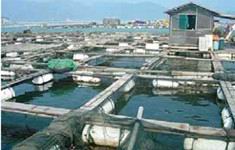 se firm claims to have the world’s largest Atlantic salmon farm and pledges to replace Chinese imports of salmon with local produce.
se firm claims to have the world’s largest Atlantic salmon farm and pledges to replace Chinese imports of salmon with local produce.Tang Jiyu, vice-GM of Shandong Oriental Ocean Co., Ltd. said his company — one of China’s largest listed seafood cultivators and processors — has “overcome the bottleneck of culturing problems of salmon” and will satisfy demand in local supermarkets and restaurants for salmon, hitherto imported from Norway and Chile.
“China’s salmon needs have so far been satisfied by imports but those imports are frozen and do not match the taste or nutritional value of our live salmon,” said Tang, whose firms sells salmon in water tanks at Chinese supermarkets. This is a sales method popular in China where consumers like to purchase live fish that is killed and gutted at home or by supermarket staff.
Shandong Oriental — which currently claims salmon output of 10 tons a month — plans to secure patents for its salmon cultivation tanks, which according to Tang are based on “water recircultation technology” and “strictly monitored” water quality gauges.
Tang isn’t the only one in the country keen to cash in on China’s demand for salmon. Chongqing salmon growers claim they can produce salmon at two-thirds the price of imported product — and they’re pledging to beat the imports on quality and taste.
“Chongqing is a very suitable place for salmon cultivation,” said Wu Qing, professor of fisheries at Southwest University in Chongqing.
Chongqing salmon will taste better than imported product because it can be more quickly brought to market, said Wu, whose university is noted in the region for its agricultural research.
“It’s at least ten days after the slaughter of the fish to get it here, and that has a critical impact on taste, this won’t be a problem for Chongqing salmon,” he said.
The recent formation of a Chongqing Salmon Industry Association will ensure international standards are drafted and applied in the local salmon sector, said Wu.
“Chongqing salmon has so much potential, it really tastes much better than imports,” said Wu.
Listed on the Shenzhen stock exchange, Shandong Oriental Ocean imported 200,000 salmon fries from Norway over the past two years and partnered with the Ocean Research Institute of the Chinese Academy of Science in a breeding program centered on Da Ji Jia town, near the port city and seafood processing hub of Yantai. Since May 2012, Shandong Oriental Ocean started to sell live salmon to local retailers, “and received recognition from food and beverage sectors for the quality of the fish,” according to an official statement from the firm. In September of last year Oriental Ocean started to supply outlets JUSCO supermarket (a subsidiary of Japan-based AEON) with whole salmon selling for CNY 550 (USD 89.71, EUR 67.66), and fresh salmon sashimi retailing for CNY 140 (USD 22.84, EUR 17.22) per 500 grams.





